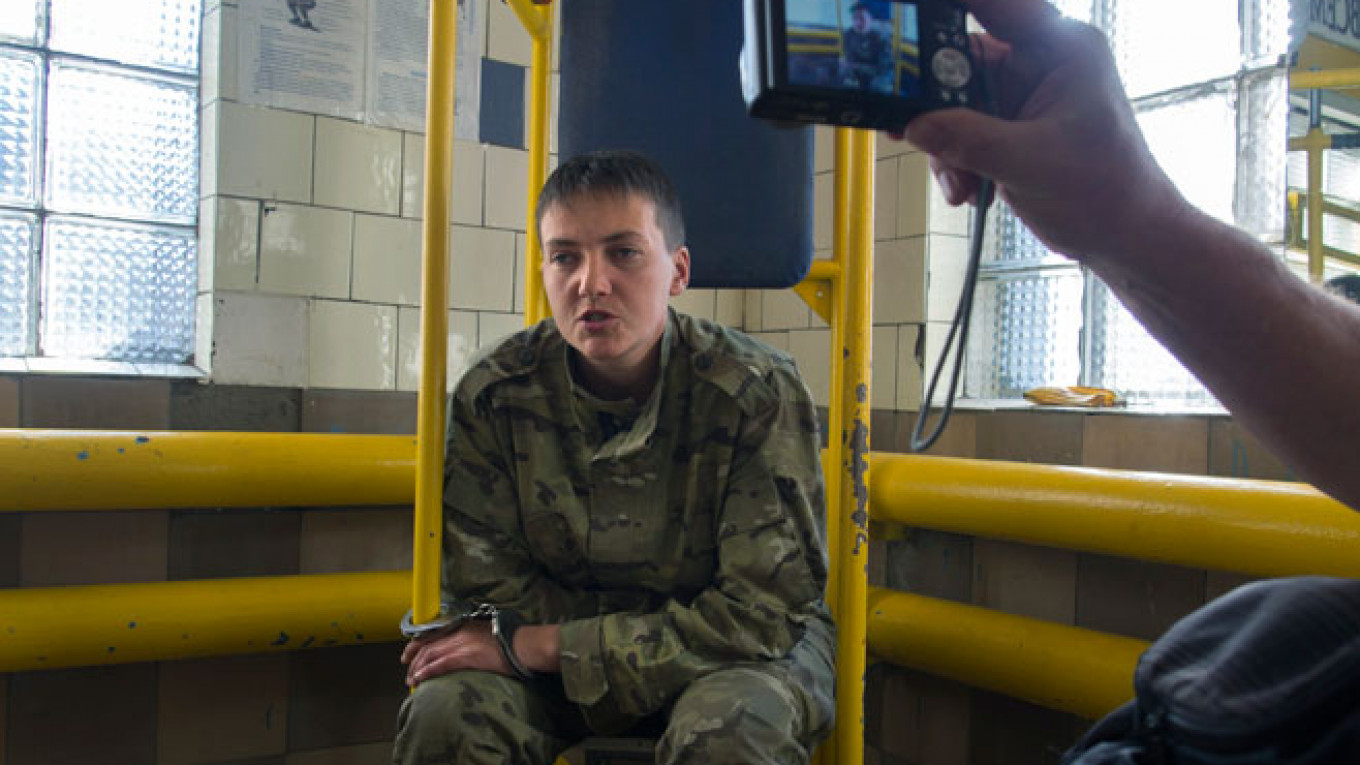A fresh diplomatic crisis has emerged over the case of a woman accused in Voronezh of having participated in the killings of two Russian journalists in Ukraine's restive east, as Kiev asserts that she was kidnapped by rebels and then "illegally trafficked" to face charges in Russia.
Russian journalists Igor Kornelyuk and Anton Voloshin of VGTRK were killed by shelling in Luhansk on June 17.
On Wednesday, Investigative Committee spokesman Vladimir Markin announced that Nadezhda Savchenko, a 33-year-old Ukrainian army officer, was believed by authorities to have provided crucial information that led to the journalists' demise.
Citing court orders, Markin said that Savchenko would remain behind bars until the end of August as an investigation runs its course. ?
But how Savchenko got behind bars in the first place remains a matter of debate. The official versions of the story proffered by Russia and Ukraine are night and day.
Russian authorities maintain that she crossed the border voluntarily as a refugee.
"As we found out, Savchenko crossed the Russian border without documentation, disguised as a refugee. She was stopped for an identity check, at which point it emerged that Savchenko was suspected of involvement in the deaths of Russian journalists in eastern Ukraine," Markin said in a statement. ?
On the other hand, Ukraine's Foreign Ministry said in a statement that she had been abducted by Russian intelligence officers after being captured by separatists in Luhansk.
"Ukraine's Foreign Ministry expresses its categorical protest against the illegal trafficking of Nadezhda Savchenko to Russia," said a statement issued by the Ukrainian Foreign Ministry.
Savchenko was described by the statement as "an officer of the Ukrainian army, who was earlier captured by the terrorist armed groups operating in eastern Ukraine."
"By kidnapping Ukrainian citizens in our country, the Russian side violates not only all norms of? international law, but also the basic rules of decency and morality," it said.
Ukrainian President Petro Poroshenko ordered Prosecutor General Vitaly Yarema to investigate the circumstances of Savchenko's "kidnapping," a statement on Ukraine's National Security and Defense Council's website said.
Head of Ukraine's Mission to the European Union Konstantyn Yeliseyev called on the EU on Wednesday to introduce tougher sanctions against Russia after yet "another violation of the norms of international law," a statement on the delegation's website said.
Amid widespread media reports in late June that Savchenko had been detained in Luhansk, Russian channel NTV broadcasted an interview with the officer during which she described herself as a member of the Ukrainian army that had been captured by rebels.
"How many times have I killed? I participated in the peacemaking operation in Iraq between 2004 and 2005. This time, I killed people during the anti-terror operation in Ukraine," she said in the interview.
When asked Wednesday by The Moscow Times, prime minister of the self-proclaimed Luhansk People's Republic Vasily Nikitin refused to confirm or deny whether the rebels captured Savchenko in the first place.
A Message from The Moscow Times:
Dear readers,
We are facing unprecedented challenges. Russia's Prosecutor General's Office has designated The Moscow Times as an "undesirable" organization, criminalizing our work and putting our staff at risk of prosecution. This follows our earlier unjust labeling as a "foreign agent."
These actions are direct attempts to silence independent journalism in Russia. The authorities claim our work "discredits the decisions of the Russian leadership." We see things differently: we strive to provide accurate, unbiased reporting on Russia.
We, the journalists of The Moscow Times, refuse to be silenced. But to continue our work, we need your help.
Your support, no matter how small, makes a world of difference. If you can, please support us monthly starting from just $2. It's quick to set up, and every contribution makes a significant impact.
By supporting The Moscow Times, you're defending open, independent journalism in the face of repression. Thank you for standing with us.
Remind me later.


